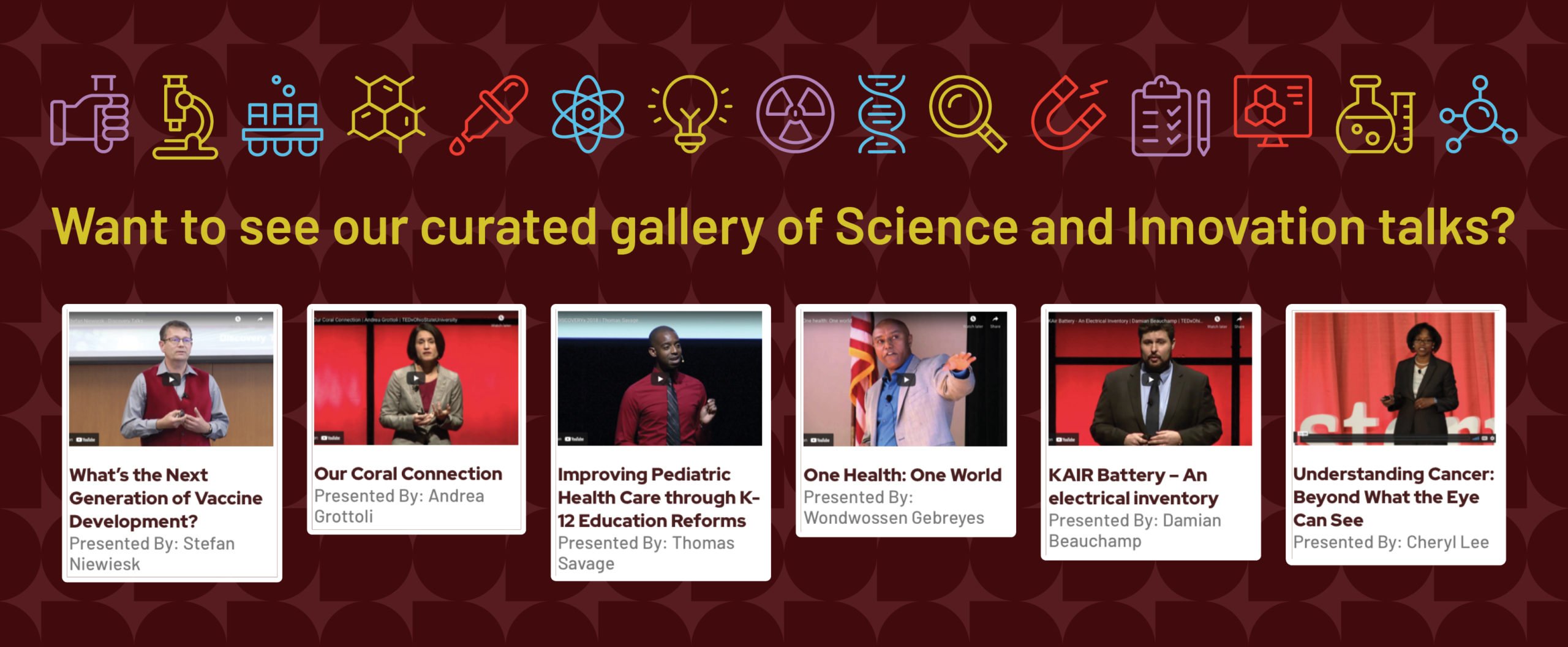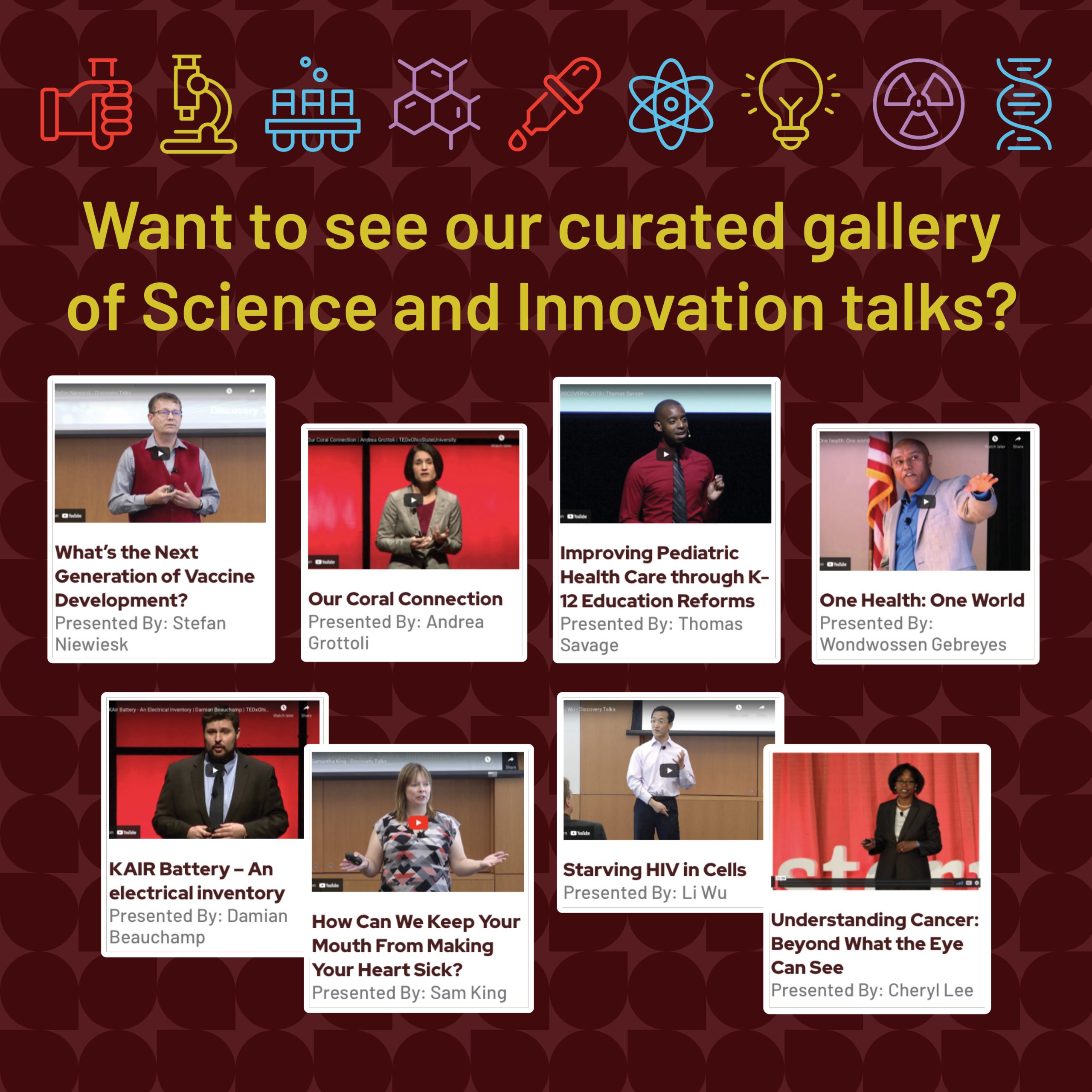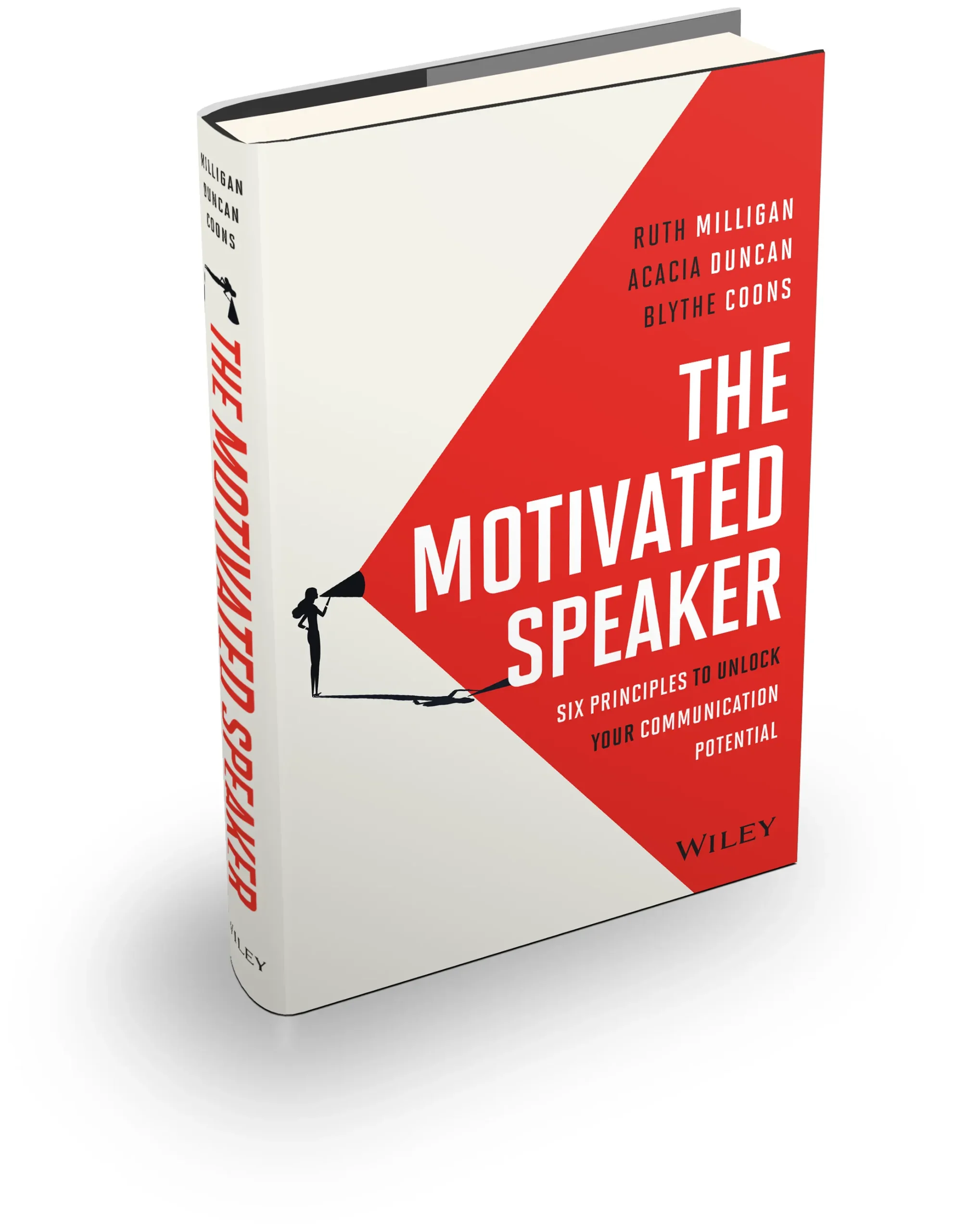SCIENCE AND INNOVATION STORYTELLING OFFERINGS
Articulation provides support to scientists and innovators in these four ways:
Making Your Science Accessible
An introductory workshop for emerging scientists
What if your storytelling challenge is with your post-docs? Or your near-docs? Or you are in a professional (private sector) setting and want to help your scientists understand better storytelling strategies?
In 2011, after coaching a cohort of emerging scientists, a leader asked us to break down the most effective science storytelling strategies. So after watching hundreds of science talks, we built a 2.5-hour course to do just that, and we have continued to adapt it over the years. It covers the top five strategies scientists should know to make science more accessible to a lay audience. This course can be delivered virtually or in-person, and it involves highly interactive exercises and breakout discussions. (Minimum of 10, maximum of 100).
Science Storytelling
Talks by principal investigators
Approach:
Imagine what you can do with a compelling science or innovation talk, 5-10 minutes long, delivered direct to camera by a primary researcher. It will be carefully edited, with your institution’s brand woven between the slides and opening / closing graphics. This video can be used as a part of a hybrid or virtual event, or on a website or social media channel.
Process:
- Choose a purpose for the communication (How will you distribute it? Where will it live?)
- Choose a Primary Investigator to tell a compelling science story
- We work with the PI to make their science accessible through 3-4 one-on-one coaching sessions
- We record the PI, either in one of our partner studios or in their lab (we provide a videographer and set up equipment)
- We help the PI edit their slides / images to be used throughout the talk
- We edit the talk with your branding guidelines
- We deliver the MP4 to you for your distribution
Benefit:
Your primary investigators will be more accountable to us for delivering a great talk. We will hold them to high standards, help them edit and narrow when they want to widen, provide public speaking and executive presence feedback, and help make them a better speaker.
Innovation Showcases
Supporting institutional events
As an institution, you may need to host a collection of great stories at a showcase conference, pitch competition or award program. We can help your researchers prepare a live talk for virtual or in-person delivery the same way we can support them in a direct-to-camera delivery. (And it might be that they are recorded onstage in front of a live audience for playback on a social channel.)
Our team can help you curate the speakers or just support coaching them. We are experts at organizing live-event content thanks to our dozen years producing TEDx events. We will make sure you are thinking in the many different planes of diversity, including race and gender, early to late stage, biomedical to automotive engineering and beyond.
Transforming Talks
Advanced group training for emerging scientists
If you want to nudge those emerging scientists one step further, we are delighted to offer our Transforming Talks program. This involves our Science Storytelling coaching for individuals (outlined above), but it is delivered in a group setting for young science professionals to learn from each other while they build a short talk. We record the talks at the end of the program in front of a small, supportive audience of peers and advisors. The recordings can be used for development purposes or in communication channels. Group coaching is delivered virtually while the capstone event is always in person.
Do you know someone like Carol?
Let us tell you a story...
It involves you, in your role as a communications or development officer at a large research institution, and Carol, a scientist or researcher aiming to innovate a solution. Maybe she’s working on how 3D printing can advance personalized medicine in head and neck surgeries. Or perhaps she’s developing quantum approaches to solving some of cancer’s deeper mysteries. She could be an electrical engineer aiming to solve how cloud computing systems can use less energy. Just imagine Carol as any one of your principal investigators.
Carol has broken through NIH, FDA or CDC barriers for some big grants (think R01), and she’s lured some state funds, too. But you have a hard time telling her story to your donors or investors. It’s complex, full of advanced science, and she goes as deep as she does wide in explaining her work. You’d love to stand her up to share her insights, but your audience has an attention span of about 10 minutes, if you’re lucky. And Carol has about 100 minutes, at least, of content she could share.
How do you get Carol to tell a science story that your donors will understand, connect with and feel motivated to follow or – ideally – invest in?
Since 2010, our firm has been coaching folks just like Carol for talks meant to communicate to people outside of her lab.
These talks have been presented at pitch competitions, donor cultivation events, innovation showcases, university award programs and on many, many TEDx stages. These are not talks that you would see at a global or national congress or conference. Instead, these are delivered to lay audiences who want (or who you want) to have access to these scientific discoveries.
Accessible content is the first step to engagement, which leads to enthusiasm, partnerships, adoption and investment.
“We heard the stories behind the science and were able to see a diverse group of committed professionals, who under Articulation’s guidance, found their voice and are motivating our teams. Perhaps more importantly, we are seeing value far beyond our event, as it is cultivating a culture of greater sharing and collaboration.”
Lara McKenzie, PhD
Research Institute at Nationwide Children’s Hospital
SCIENCE AND INNOVATION STORYTELLING OFFERINGS
Articulation provides support to scientists and innovators in these four ways:
Science Storytelling
Talks by principal investigators
Approach:
Imagine what you can do with a compelling science or innovation talk, 5-10 minutes long, delivered direct to camera by a primary researcher. It will be carefully edited, with your institution’s brand woven between the slides and opening / closing graphics. This video can be used as a part of a hybrid or virtual event, or on a website or social media channel.
Process:
- Choose a purpose for the communication (How will you distribute it? Where will it live?)
- Choose a Primary Investigator to tell a compelling science story
- We work with the PI to make their science accessible through 3-4 one-on-one coaching sessions
- We record the PI, either in one of our partner studios or in their lab (we provide a videographer and set up equipment)
- We help the PI edit their slides / images to be used throughout the talk
- We edit the talk with your branding guidelines
- We deliver the MP4 to you for your distribution
Benefit:
Your primary investigators will be more accountable to us for delivering a great talk. We will hold them to high standards, help them edit and narrow when they want to widen, provide public speaking and executive presence feedback, and help make them a better speaker.
Innovation Showcases
Supporting institutional events
As an institution, you may need to host a collection of great stories at a showcase conference, pitch competition or award program. We can help your researchers prepare a live talk for virtual or in-person delivery the same way we can support them in a direct-to-camera delivery. (And it might be that they are recorded onstage in front of a live audience for playback on a social channel.)
Our team can help you curate the speakers or just support coaching them. We are experts at organizing live-event content thanks to our dozen years producing TEDx events. We will make sure you are thinking in the many different planes of diversity, including race and gender, early to late stage, biomedical to automotive engineering and beyond.
Making Your Science Accessible
An introductory workshop for emerging scientists
What if your storytelling challenge is with your post-docs? Or your near-docs? Or you are in a professional (private sector) setting and want to help your scientists understand better storytelling strategies?
In 2011, after coaching a cohort of emerging scientists, a leader asked us to break down the most effective science storytelling strategies. So after watching hundreds of science talks, we built a 2.5-hour course to do just that, and we have continued to adapt it over the years. It covers the top five strategies scientists should know to make science more accessible to a lay audience. This course can be delivered virtually or in-person, and it involves highly interactive exercises and breakout discussions. (Minimum of 10, maximum of 100).
Transforming Talks
Advanced group training for emerging scientists
If you want to nudge those emerging scientists one step further, we are delighted to offer our Transforming Talks program. This involves our Science Storytelling coaching for individuals (outlined above), but it is delivered in a group setting for young science professionals to learn from each other while they build a short talk. We record the talks at the end of the program in front of a small, supportive audience of peers and advisors. The recordings can be used for development purposes or in communication channels. Group coaching is delivered virtually while the capstone event is always in person.
Do you know someone like Carol?
Let us tell you a story...
It involves you, in your role as a communications or development officer at a large research institution, and Carol, a scientist or researcher aiming to innovate a solution. Maybe she’s working on how 3D printing can advance personalized medicine in head and neck surgeries. Or perhaps she’s developing quantum approaches to solving some of cancer’s deeper mysteries. She could be an electrical engineer aiming to solve how cloud computing systems can use less energy. Just imagine Carol as any one of your principal investigators.
Carol has broken through NIH, FDA or CDC barriers for some big grants (think R01), and she’s lured some state funds, too. But you have a hard time telling her story to your donors or investors. It’s complex, full of advanced science, and she goes as deep as she does wide in explaining her work. You’d love to stand her up to share her insights, but your audience has an attention span of about 10 minutes, if you’re lucky. And Carol has about 100 minutes, at least, of content she could share.
How do you get Carol to tell a science story that your donors will understand, connect with and feel motivated to follow or – ideally – invest in?
Since 2010, our firm has been coaching folks just like Carol for talks meant to communicate to people outside of her lab.
These talks have been presented at pitch competitions, donor cultivation events, innovation showcases, university award programs and on many, many TEDx stages. These are not talks that you would see at a global or national congress or conference. Instead, these are delivered to lay audiences who want (or who you want) to have access to these scientific discoveries.
Accessible content is the first step to engagement, which leads to enthusiasm, partnerships, adoption and investment.
“We heard the stories behind the science and were able to see a diverse group of committed professionals, who under Articulation’s guidance, found their voice and are motivating our teams. Perhaps more importantly, we are seeing value far beyond our event, as it is cultivating a culture of greater sharing and collaboration.”
Lara McKenzie, PhD
Research Institute at Nationwide Children’s Hospital
SCIENCE AND INNOVATION STORYTELLING OFFERINGS
It involves you, in your role as a communications or development officer at a large research institution, and Carol, a scientist or researcher aiming to innovate a solution. Maybe she’s working on how 3D printing can advance personalized medicine in head and neck surgeries. Or perhaps she’s developing quantum approaches to solving some of cancer’s deeper mysteries. She could be an electrical engineer aiming to solve how cloud computing systems can use less energy. Just imagine Carol as any one of your principal investigators.
Carol has broken through NIH, FDA or CDC barriers for some big grants (think R01), and she’s lured some state funds, too. But you have a hard time telling her story to your donors or investors. It’s complex, full of advanced science, and she goes as deep as she does wide in explaining her work. You’d love to stand her up to share her insights, but your audience has an attention span of about 10 minutes, if you’re lucky. And Carol has about 100 minutes, at least, of content she could share.
How do you get Carol to tell a science story that your donors will understand, connect with and feel motivated to follow or – ideally – invest in?
Since 2010, our firm has been coaching folks just like Carol for talks meant to communicate to people outside of her lab.
These talks have been presented at pitch competitions, donor cultivation events, innovation showcases, university award programs and on many, many TEDx stages. These are not talks that you would see at a global or national congress or conference. Instead, these are delivered to lay audiences who want (or who you want) to have access to these scientific discoveries.
Accessible content is the first step to engagement, which leads to enthusiasm, partnerships, adoption and investment.
Articulation provides support to scientists and innovators in these four ways:
Science Storytelling
Talks by principal investigators
Approach:
Imagine what you can do with a compelling science or innovation talk, 5-10 minutes long, delivered direct to camera by a primary researcher. It will be carefully edited, with your institution’s brand woven between the slides and opening / closing graphics. This video can be used as a part of a hybrid or virtual event, or on a website or social media channel.
Process:
- Choose a purpose for the communication (How will you distribute it? Where will it live?)
- Choose a Primary Investigator to tell a compelling science story
- We work with the PI to make their science accessible through 3-4 one-on-one coaching sessions
- We record the PI, either in one of our partner studios or in their lab (we provide a videographer and set up equipment)
- We help the PI edit their slides / images to be used throughout the talk
- We edit the talk with your branding guidelines
- We deliver the MP4 to you for your distribution
Benefit:
Your primary investigators will be more accountable to us for delivering a great talk. We will hold them to high standards, help them edit and narrow when they want to widen, provide public speaking and executive presence feedback, and help make them a better speaker.
Innovation Showcases
Supporting institutional events
As an institution, you may need to host a collection of great stories at a showcase conference, pitch competition or award program. We can help your researchers prepare a live talk for virtual or in-person delivery the same way we can support them in a direct-to-camera delivery. (And it might be that they are recorded onstage in front of a live audience for playback on a social channel.)
Our team can help you curate the speakers or just support coaching them. We are experts at organizing live-event content thanks to our dozen years producing TEDx events. We will make sure you are thinking in the many different planes of diversity, including race and gender, early to late stage, biomedical to automotive engineering and beyond.
Making Your Science Accessible
An introductory workshop for emerging scientists
What if your storytelling challenge is with your post-docs? Or your near-docs? Or you are in a professional (private sector) setting and want to help your scientists understand better storytelling strategies?
In 2011, after coaching a cohort of emerging scientists, a leader asked us to break down the most effective science storytelling strategies. So after watching hundreds of science talks, we built a 2.5-hour course to do just that, and we have continued to adapt it over the years. It covers the top five strategies scientists should know to make science more accessible to a lay audience. This course can be delivered virtually or in-person, and it involves highly interactive exercises and breakout discussions. (Minimum of 10, maximum of 100).
Transforming Talks
Advanced group training for emerging scientists
If you want to nudge those emerging scientists one step further, we are delighted to offer our Transforming Talks program. This involves our Science Storytelling coaching for individuals (outlined above), but it is delivered in a group setting for young science professionals to learn from each other while they build a short talk. We record the talks at the end of the program in front of a small, supportive audience of peers and advisors. The recordings can be used for development purposes or in communication channels. Group coaching is delivered virtually while the capstone event is always in person.
“We heard the stories behind the science and were able to see a diverse group of committed professionals, who under Articulation’s guidance, found their voice and are motivating our teams. Perhaps more importantly, we are seeing value far beyond our event, as it is cultivating a culture of greater sharing and collaboration.”
Lara McKenzie, PhD
Research Institute at
Nationwide Children’s Hospital



